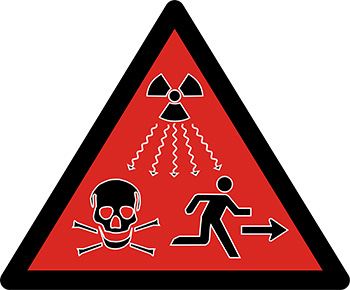Nuclear smuggling risks continue to haunt our seaports
Joint hearing examines security threats at U.S. ports

According to American Association of Port Authorities (AAPA), the threat of terrorist smuggling at U.S. ports appears to be increasing.
Mechanisms to prevent cyber terrorism and illegal nuclear materials from being trafficked through ports must be intensified. Port Security Grant funds continue to help address these threats, but they must be directed to ports and not diluted out to other law enforcement entities that focus on lower-risk endeavors. And, increasingly, U.S. ports need more Customs and Border Protection (CBP) personnel, not fewer, to counter these risks.
These are the “take-away” messages that the AAPA hopes to instill when Maryland Port Administration Security Director Dave Espie testifies tomorrow (Thursday, July 7) on behalf of the association.
Espie will explain to a joint hearing of the House Transportation and Infrastructure Committee’s Subcommittee on Coast Guard and Maritime Transportation, and the House Homeland Security Committee’s Subcommittee on Border and Maritime Security, that maritime nuclear smuggling “could ultimately impact the safety and security of the United States if not addressed in a cohesive and expedited manner.”
Espie is a retired FBI agent and former National Security Agency Special Agent. In his testimony, he will explain the need for sound diplomatic relationships with nations that cooperate with the U.S. to secure their own nuclear materials, and the need for them to assist in countering ambitions of nuclear countries intent on inflicting harm with their fissionable materials.
He will also encourage Members of Congress to continue funding ports and to give those ports authority to distribute grant funds to other policing agencies that will use the money for its intended purpose.
Finally, he will ask that CBP assign more than 1 percent of its new hires to seaports, which was the approximate staffing ratio of CBP new hires to ports in fiscal year 2015.
“Our nation’s strategy to prevent maritime nuclear smuggling must utilize a holistic approach,” said Espie, who adds that that this should incorporate diplomatic engagement.
Furthermore, he said, it should utilize intelligence community assets (human, cyber and technical), focus on port security protocols (both federally mandated and those imposed by port operators), increase Port Security Grant funding to ensure ports are brought up to and remain in federal compliance, and appropriately invest in federal agencies like CBP to ensure current and future legislative mandates are properly executed.
Last week, the House Ports Opportunity, Renewal, Trade, and Security (PORTS) Caucus sent a letter to Homeland Security Secretary Jeh Johnson, urging him to allocate more resources to address CBP staffing shortages at U.S. seaports. Led by Representatives J. Randy Forbes (R-VA) and Kathy Castor (D-FL), and PORTS Caucus co-chairs Ted Poe (R-TX) and Janice Hahn (D-CA), the letter was signed by 47 Members of Congress.

Article Topics
Blogs News & Resources
Latest in Materials Handling
Registration open for Pack Expo International 2024 Walmart chooses Swisslog AS/RS and software for third milk processing facility NetLogistik partners with Vuzix subsidiary Moviynt to offer mobility solutions for warehouses Materials Handling Robotics: The new world of heterogeneous robotic integration BSLBATT is looking for new distributors and resellers worldwide Lucas Watson appointed CSO for Körber’s Parcel Logistics business in North America Hyster recognizes Dealers of Distinction for 2023 More Materials HandlingAbout the Author
Subscribe to Materials Handling Magazine

Find out what the world's most innovative companies are doing to improve productivity in their plants and distribution centers.
Start your FREE subscription today.
April 2024 Modern Materials Handling

Latest Resources










